Reconsidering Final Fantasy XV
Is it possible to eke out a fondness from something you hate?
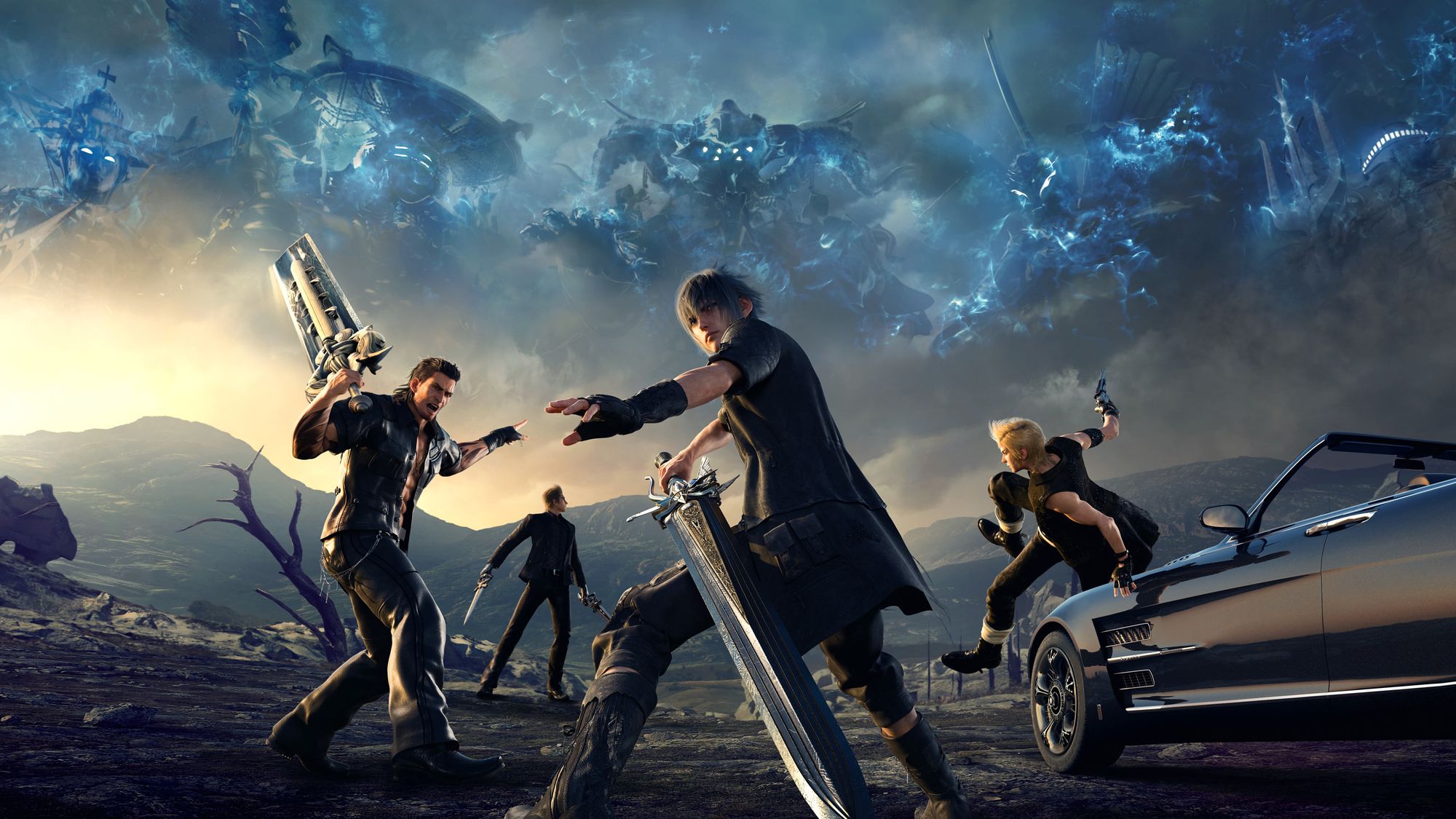
I've been playing Final Fantasy games for over twenty years. It's not hyperbolic for me to say that they defined the medium for me as a child, that Final Fantasy carved something out of videogamedom and placed it on a gilded platter, that the worlds of Hironobu Sakaguchi and SquareSoft ignited my imagination to a degree that has affected me personally and creatively to this day.
This is a difficult thing for an oldhead fan to admit, but Final Fantasy has changed. Whether you're a recent fan or someone that has been playing since 1987, you may have noticed that Final Fantasy's only constant is that it's rarely constant. While we rest our laurels on the nostalgic posts of magics, summons, weapons, and characters that share identities, Final Fantasy's dictate is made of the current team, the current director, and the current climate. Final Fantasy VI was not made in 2023, and Final Fantasy XV was not made in 2016. To be a Final Fantasy fan is to accept or resist this undulation.
There are mainstay arguments as old as time that plague the collective consciousness of Final Fantasy enjoyers, offline or on. Is Final Fantasy XII actually good? Should MMOs be accepted as main series entries? Is Final Fantasy turn-based, action, or something else? And what do we actually mean when we say Final Fantasy, except to point to living examples and past identities, cobbling together an unfortunate pastiche that makes even adamant fans feel disparate and dispirited? Can Final Fantasy actually be defined?
Travel back with me to the long-ago era of 2016. Enter: Final Fantasy XV.
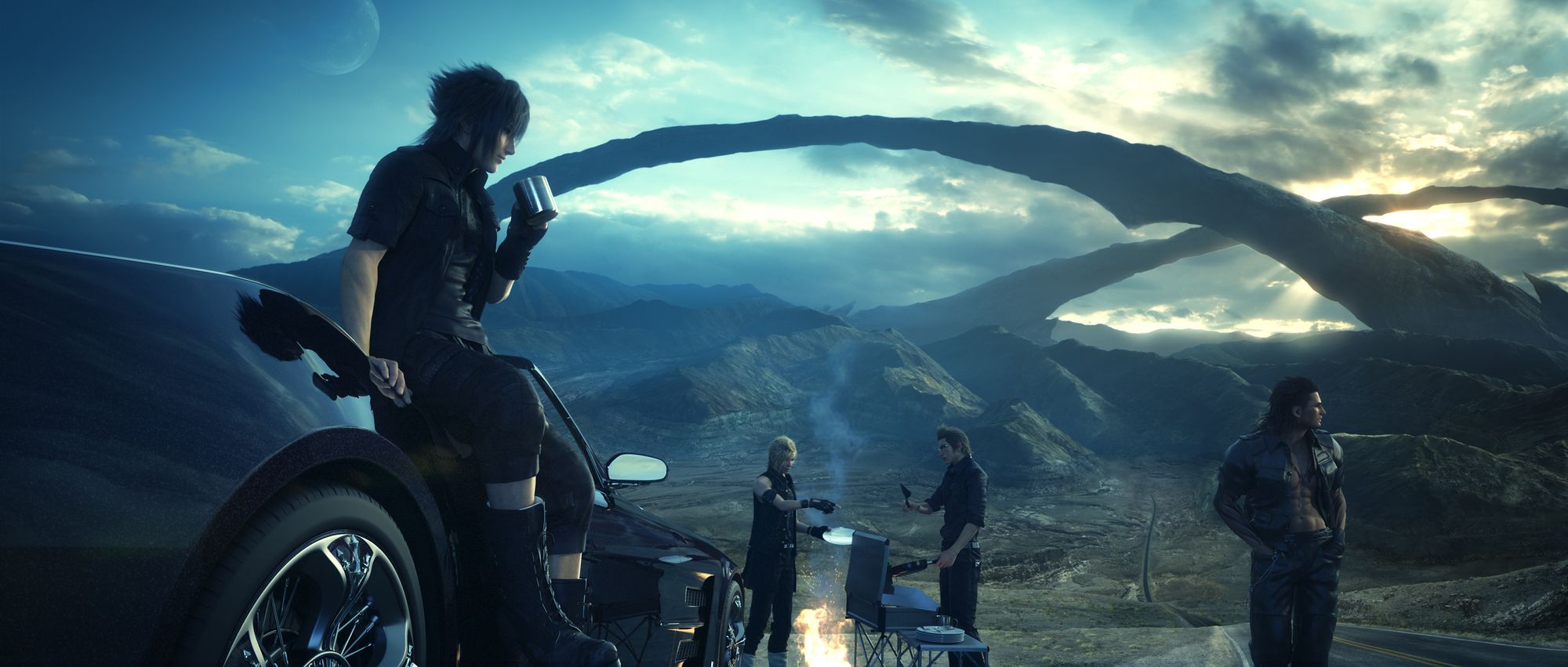
It was a strange time, 2016. The Last Guardian finally released that year (one of the best games ever made, let's argue), as did Dark Souls III, DOOM, Firewatch, and Uncharted 4. It was also a year loudly lambasted as "the worst year ever" because a few beloved celebrities died; a strange juxtaposition with what we'd consider made the worst year ever in 2020. Now, in 2023, we live in the shadow of death, dust barely settling on shared traumas that we refuse to acknowledge. In 2016 I was a different person than in 2023. In both 2016, and 2023, I played Final Fantasy XV.
Final Fantasy XV's journey to me was as fraught as my time spent waiting for it. With tax returns, in 2008, I purchased a PlayStation 3 in anticipation of Final Fantasy Versus XIII. In 2013, Final Fantasy Versus XIII ceremoniously became Final Fantasy XV. In 2016, Final Fantasy XV was released. Between those years I anticipated something that I only had the barest inkling over. I watched trailers that would turn out to be false (remember Fabula Nova Crystallis?), I named myself after Noctis on forums, and my imagination ran wild with what "A Fantasy Based On Reality" might actually entail. Across both Final Fantasy Versus XIII and Final Fantasy XV, few things in the design remained constant, and what Hajime Tabata and his team were able to repurpose from Versus XIII's failures was something noticeably different from Tetsuya Nomura's vision. The song "Somnus" has remained ever-vigilant across the designs, though even Noctis changed in clothing, ability, and attitude. Versus XIII and Final Fantasy XV are like peering into alternate realities.

Across both Final Fantasy Versus XIII and Final Fantasy XV, few things in the design remained constant, and what Hajime Tabata and his team were able to repurpose from Versus XIII's failures was something noticeably different from Tetsuya Nomura's vision.
It was difficult to not be excited about Final Fantasy Versus XIII. The game's infamous teaser trailer sets a dark mood for the series, showing a brooding hero in a rainy metropolis who engages in violent battles with godlike abilities. While Versus XIII bears aesthetic similarities to XV, it's impossible to not get the impression from the earlier trailers that Versus XIII held a much more serious, moody tone. While Versus XIII was set up from the beginning to be an adventure about four young men waging war against an empire, the "Fantasy Based On Reality" schtick skewed even more 21st century than what we got in XV. The post-apocalyptic world that the proto versions of Noctis, Prompto, Gladio, and Ignis explored in Versus XIII portrayed an even more serious tone than XV, and Stella Nox Fleuret (seen in the 2011 trailer for Versus XIII) was completely reworked into Lunafreya, Noctis' tragic love interest. While Lunafreya exists as the Oracle in Final Fantasy XV, a companion to Noctis' royal ascension and a speaker for the Astrals, Stella seemed to be a unique entry in Square's canon concerning female characters: she could summon blades similar to Noctis and even fought with him, and against him.
When Tabata took over Final Fantasy XV's development, he and his team cleaved it away from the Fabula Nova Crystallis, abandoning the identity that Versus XIII shared with Final Fantasy XIII and the world of Pulse. While various nods to Final Fantasy XIII can be seen throughout Versus XIII's trailers, few things from Final Fantasy XIII were kept in XV, with one major example being the painting of Etro in Kingsglaive—the same painting of the Final Fantasy XIII goddess seen in the 2011 trailer of Versus XIII.
Part of what makes Final Fantasy XV so difficult to palate is in the very nature of its design—after ten years of development, swapping directors, changing teams, and scrambling through identities, it's hard to not acknowledge Final Fantasy XV as less of a mainline entry and more a resuscitation of resources.
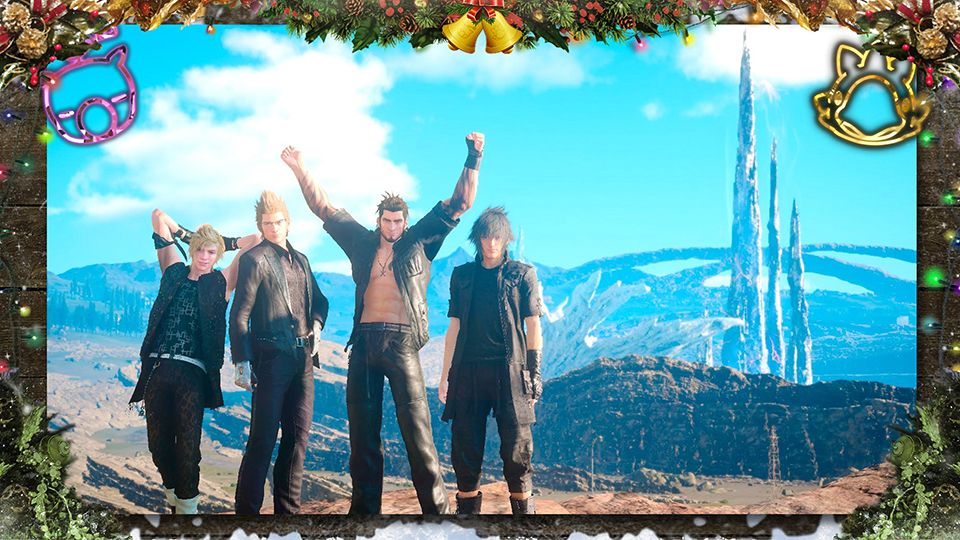
I loved Final Fantasy XV, briefly, when I first played it in 2016. My experience to date with "open world" games is thin, because of how open, endless, and exhausting they often are. After 85 hours spent with Final Fantasy XV, after attaining a platinum trophy, after spending money on a special edition and a strategy guide, after watching Kingsglaive, after engaging in Final Fantasy XV media for longer than I had ever wished, I was left with a hollow feeling that evolved into something far sourer. My brief enjoyment of Final Fantasy XV, as the years went on, changed considerably after playing it. It wasn't only that I disliked the game as I thought back upon it, but that I couldn't help but see it as a lesser Final Fantasy title. With a broken story delivered across countless different mediums and an adventure divvied up between numerous gameplay styles, Final Fantasy XV didn't seem to know what it was, which meant I didn't know what it was either. Every piece of fondness that I had developed for Final Fantasy XV before and after its development rotted away until I was left with a consuming black hole that erased any goodwill I ever had for the title. It became, over time, not only a lesser main series title, but my least favorite entry in the entire series.
I hated Final Fantasy XV.
After so many years existing as a Final Fantasy fan and loving the series throughout its many permutations, I never expected such a prolific title to be something I loathed. What time worsened was my relationship with the game's characters and story, something that has only germinated positively with every other entry in the mainline series. I found that I could not engage in even a casual conversation about Final Fantasy XV without criticizing its battle system, lambasting its poorly-paced story, or decrying its uneven pacing and bloated quest-based adventuring. It wasn't that Final Fantasy XV was different, it's that it simply was not a good video game.
While Final Fantasy XV has become a bestseller for Square Enix, sales did not necessarily translate into appreciation. Final Fantasy XV has become incredibly controversial in the intervening years, with both casual and longtime fans criticizing its world, story, and gameplay. Bring up Final Fantasy XV in an environment where people know it, and you'll likely see a mix of responses running from enjoyment to hatred. While I have no doubts that Tabata and his team did the best they could with what they had, it's no secret that Square Enix's selfish business decisions thwarted what otherwise could have been a much more enjoyable experience.
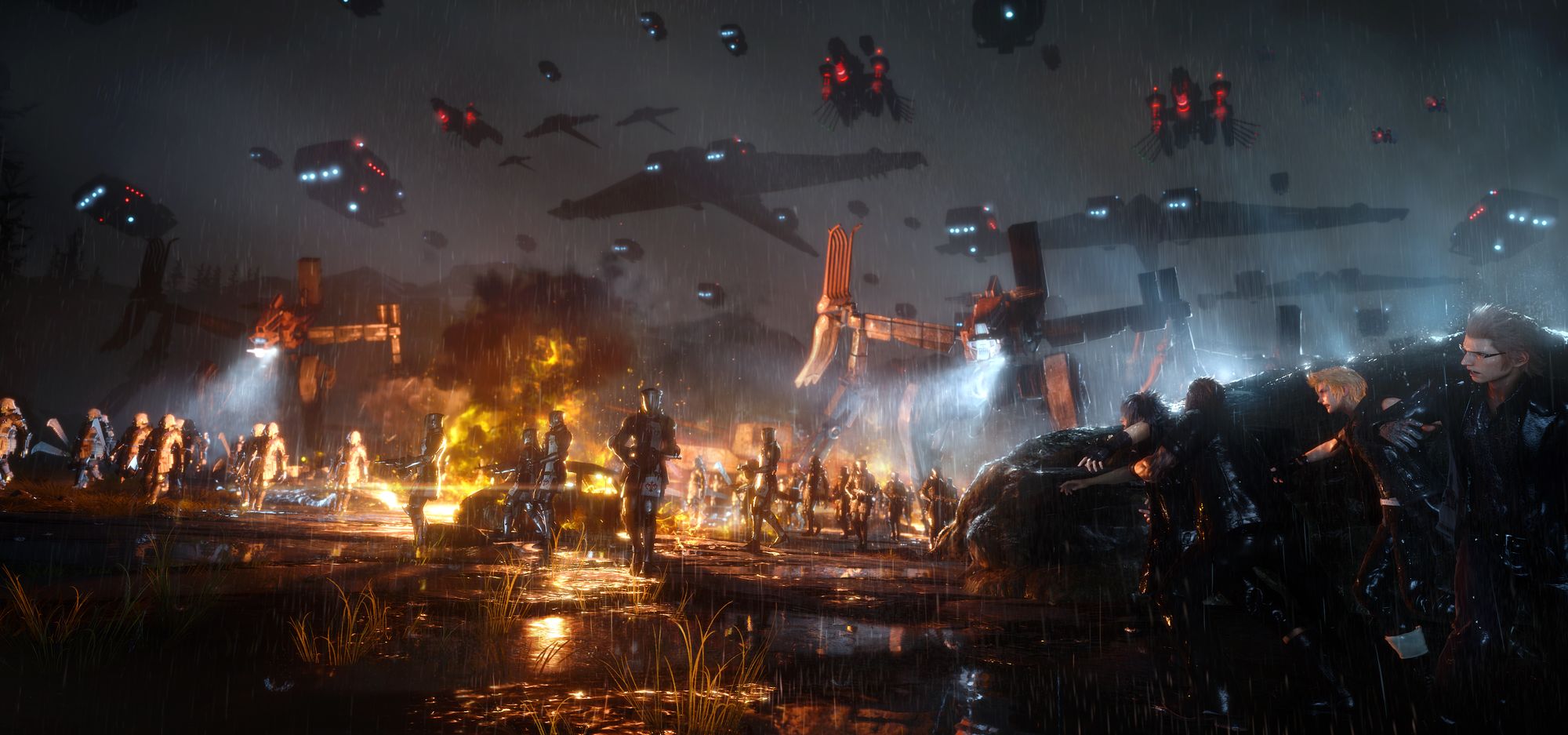
After so many years existing as a Final Fantasy fan and loving the series throughout its many permutations, I never expected such a prolific title to be something I loathed.
With Final Fantasy XVI soon coming, I decided now was the perfect time to finally revisit Final Fantasy XV, this time with the completed "Royal Edition." Royal Edition not only added new gameplay elements to Final Fantasy XV, but fleshed out story elements, pacing, and character interactions that were missing from the base game. I respect anyone whose negative opinion of Final Fantasy XV thwarts the very idea of playing Royal Edition—these days it's frustrating to have to play a "completed" or "GOTY" edition of the same game a year later just to have the developers finally finish what should have been a polished package from the get-go. In Final Fantasy XV Royal Edition's case, I must say if you've found your relationship with XV to be less than stellar, consider giving it a try.
My intense disappointment in Final Fantasy XV might seem strange to anyone who doesn't actively participate in the cultish endeavors of Square Enix. It's difficult to be a Square fan at the best of times, because of a parade of baffling decisions that result in some of the best and worst games you've ever played. From high highs to low lows, it's the ride of a lifetime. While Square Soft was once the king of RPGs and its logo swore a certain kind of guaranteed quality, Square Enix's overreach has thinned expectations. Final Fantasy XV felt like the nail in the coffin in some ways, but there have always been moments of hope—Final Fantasy XIV is a celebration of everything Final Fantasy can be, and Final Fantasy XVI is shaping up to be the sort of massive spectacle that defines this series.
The differences and changes to Royal Edition are not immediate—anyone who disliked the game's glacial pacing and strange opening sequences won't find themselves endeared by Final Fantasy XV's first few hours. Even with the inclusion of some scenes from Kingsglaive as "new" cutscenes in Royal, it's very frustrating that the experience with XV doesn't start at the title screen: Square expects you to watch a movie and an anime to get a feel for the characters. This is, in part, the major enduring criticism of Final Fantasy XV; its storytelling is completely hamstrung by additional media that serves no real purpose except to divide the experience so that Square could make a few extra bucks. This, unfortunately, is damning to the experience for many, but worsened by what is actually a finely-constructed world. If not for the way its narrative was handled, Final Fantasy XV could have been one of the best stories in the entire series, it's just that the best of its lore and design is completely hidden from the player. This makes the game extra frustrating, especially if you decide to hunt through wikis and YouTube videos like I did, attempting to glean something of a cohesive narrative. While Final Fantasy XV wants you to believe the story is only concerned about the traveling aristocratic boy band, its world is replete with depth, originality, and flavor.
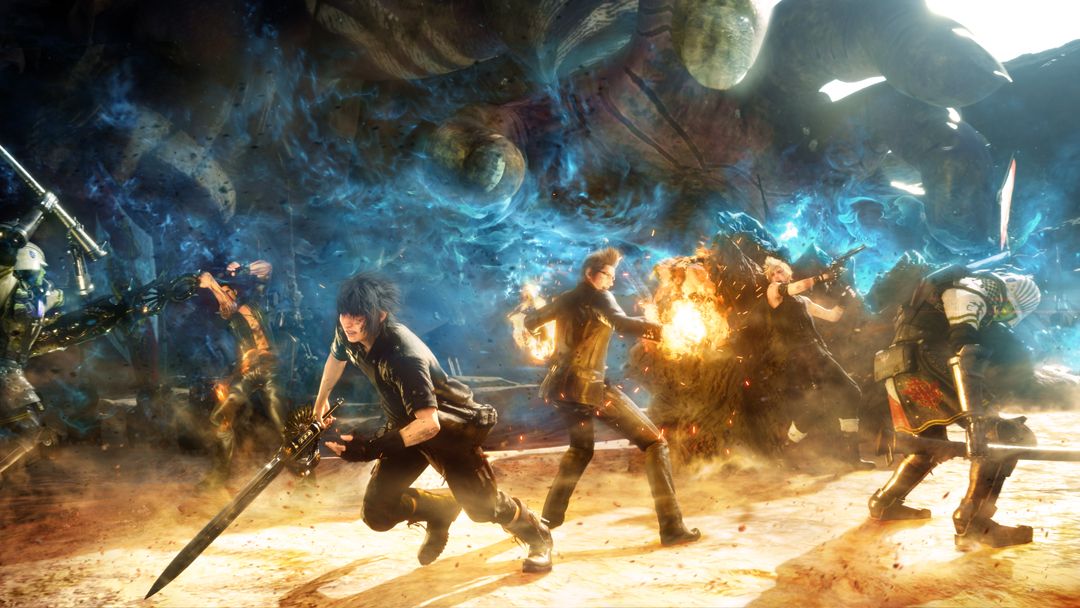
This, too, is enough to make any long-time Final Fantasy fan scream. While the storytelling in Final Fantasy is not always straightforward, and entries such as Final Fantasy VIII and Final Fantasy XIII infamously hid far too many details from the player, Final Fantasy XV is obtuse by way of sales tactic. This is partially remedied in Royal Edition, and after a few hours of play I found myself once again endeared not by the game's presentation, but by the interactions between the characters. What strengthens the game is the believability of the friendship between Noctis and his trusted team: Gladio is the ever-grumpy older brother figure, Prompto is the affable and lovable goon, and Ignis persists as walking atlas and cook, keeping the party alive throughout their misadventures. If you allow yourself to become swept away in the scope of their adventure, this is Final Fantasy in a nutshell: a group of characters bonding together while teaming up against an evil empire.
Royal Edition's positives are easy enough to rattle off: additional cutscenes, improved story, better quality of life features, enhanced combat, and new areas to explore. All in all, it sounds like typical enhancement fare, the sort of upgrade you'd expect from the new edition of any RPG. What takes Royal Edition a step further is how it has allowed the player to carve out a new experience, especially if they've already played Final Fantasy XV once before. While my initial runtime was around 85 hours, I completed Royal Edition (including the new content) in under 42 hours. This, alone, should be attractive to anyone with a fondness for the PS1 and PS2 era, where "lengthy" RPGs with rich stories and profound gameplay ended well before the 50 hour mark. Without the bloat of side quests and empty worlds, RPGs once focused nearly exclusively on the richness of story, location, and event. With Royal Edition's updates, it adheres mostly to these principles.
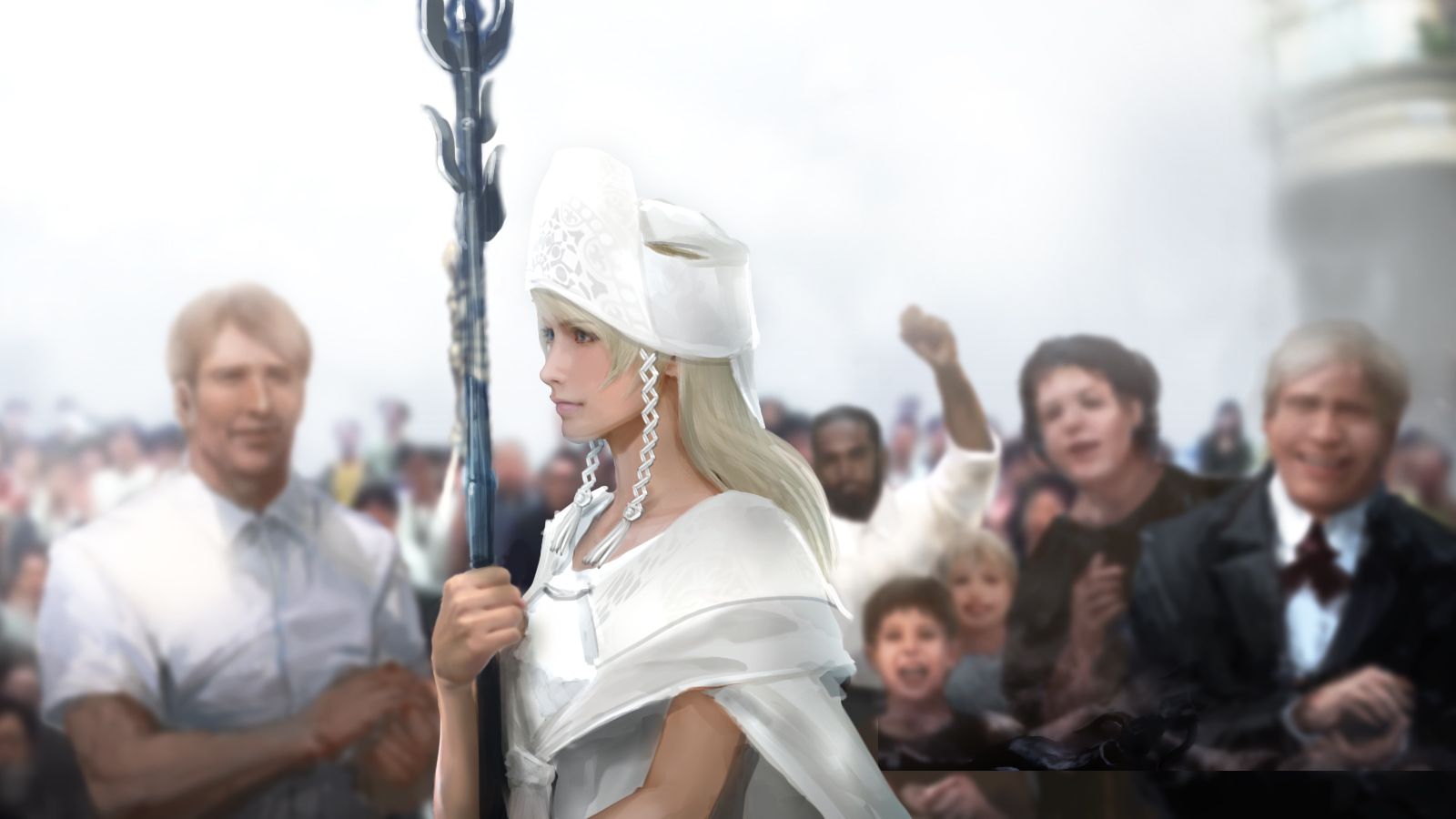
While my initial runtime was around 85 hours, I completed Royal Edition (including the new content) in under 42 hours. This, alone, should be attractive to anyone with a fondness for the PS1 and PS2 era, where "lengthy" RPGs with rich stories and profound gameplay ended well before the 50 hour mark.
Final Fantasy XV: Royal Edition can be enjoyed entirely (and I would argue, preferably) without doing a single side quest that has you engage in nothing more than killing a few enemies, finding frogs, or talking to some person that's a 30-second walk away. While the hunts are still an engaging option (something from Final Fantasy XII that's also going to be in Final Fantasy XVI), the general quests in XV are both arduous and unnecessary, and detract from the adventure. With expanded chapters and a new final dungeon, there's little reason to extend your experience with XV beyond the reach of its story.
The road trip vibes remain immaculate, and are one of my fondest memories of XV both before and after Royal Edition. Watching the four friends talk and relax in the car as it speeds past beautiful vistas while listening to classic Final Fantasy tunes remains impeccable design, and is a way to appreciate the aesthetics of the game in a way that rivals sailing the ocean in The Legend of Zelda: The Wind Waker. It's here that I cannot help but think how much better Final Fantasy XV would have been if it had incorporated major locales between highway stops, in a way that composites classic Final Fantasy overworld design and modern preferences. Final Fantasy XV's world of Eos is already quite different from the sort of "open world" we are used to today—unlike Ghost of Tsushima, Elden Ring, or Breath of the Wild, huge swathes of XV's landscape are unreachable. It is, instead, almost divided into extra-large explorable zones, though the feeling of emptiness can persevere when you're not running from side quest to side quest. Upon revisiting Royal Edition, I couldn't help but be enamored by the poignancy of these car trips, and how they evoked a nostalgia for something that wasn't mine to feel.
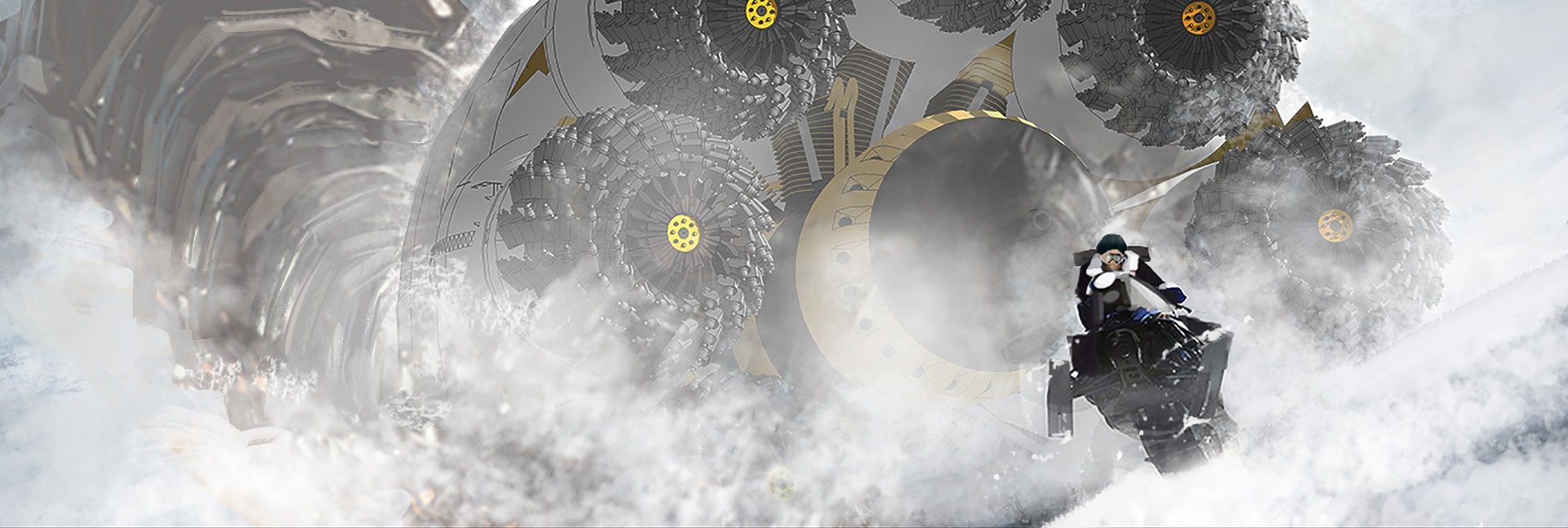
Combat faces no major overhaul in Royal Edition, and anyone who dislikes Final Fantasy XV's combat will find little reason to return. The combat is one of the major issues I have with the game, and bears little enjoyment for the overall experience; while early trailers for Final Fantasy XV advertized something akin to Kingdom Hearts' dynamic action combat, Final Fantasy XV offers little in the way of player control outside of guarding and casting magic. While the same criticism can be applied to Final Fantasy XII's ADB (Active Dimension Battle) auto-battle system, it's majorly reinforced by the game's robust and strategic gambits. Final Fantasy XV's combat provides little in the way of depth, even with Royal Edition's inclusion of party member control. With the robust Final Fantasy VII Remake battle system that combines action and turn-based, and Final Fantasy XVI's heartily-crafted Devil May Cry inspired combat on the horizon, Final Fantasy XV's combat feels far more archaic and uninspired than it should. Royal Edition does include the addition of the Armiger Unleashed (very) late in the game, but its an aspect of the combat that feels as though it should have been included from the start, and only gives a taste of what fed our imaginations through Versus XIII's wild and frantic cutscenes all those years ago.
Royal Edition's defining characteristic, in my opinion, is its inclusion of new and fleshed-out story beats. Chapter Twelve's expansion alone might be enough to play Royal Edition, with its additional cutscenes and expanded narrative that adds more weight to Noctis and Lunafreya's relationship, as well as the relationship between the Astrals and humankind. It's painful how much is held back in Final Fantasy XV, how the kingdom of Lucis and its duty to the world of Eos is shaped by thousands of years of history, how its warring states and variable politics have crafted an environment of disparate empires that evokes both Final Fantasy VI and Final Fantasy XII. In too many ways, Final Fantasy XV feels like it desires to be a modernization of Final Fantasy VI, but exists only as an aesthetic homunculus of the previous game's interpretation of apocalypse. Would Final Fantasy XV have been better with a more balanced narrative? Should it have spent more time on story beats and less on pointless questing? Could Final Fantasy XV have reached cult status simply by adhering more closely to tradition? Much of the madness that comes with pondering Final Fantasy XV is in the endless parade of "what ifs."
"Overall, I really like Final Fantasy VI. The universe and music are particularly amazing, and I feel that the title epitomizes what Final Fantasy is about. So the monster battles in urban areas and the dungeons in Final Fantasy XV were inspired by those from Final Fantasy VI."
Hajime Tabata
I can't help but be struck by melancholy when I'm playing Final Fantasy XV. Not because I am burdened by the knowledge of what it was, or what it isn't, but because it feels like a game bordering lifetimes. Playing it in 2016, I was sucked into its gameplay loop, but like with most open-world games I felt incredibly hollow once the experience was over. One major issue I have with open world games is how their experiences are immensely solitary; where it's fun to compare moments in traditionally linear games, open world design leans much too far into choice, granting the player an authorial feel that detracts from the story and vibes. In my decision to pursue the story in Royal Edition almost single-mindedly, I was rewarded with an experience that adhered much closer to classic RPG design, which reinforced the experience as a whole.
I can't help but be struck by melancholy when I'm playing Final Fantasy XV. Not because I am burdened by the knowledge of what it was, or what it isn't, but because it feels like a game bordering lifetimes.
Ultimately, it's a challenge to care about another person's opinion of a game, and when it comes to Final Fantasy XV that relationship is uniquely personal. Anyone, like me, that's been following Final Fantasy XV's development since the early days of Versus XIII has approached the game with a sense of apprehension from years back, and now that estranged relationship feels completely foreign to a person who proudly displays any numbered entry as their favorite game of all time. I'm no stranger to loving imperfect things: my favorite Final Fantasy is VIII, and I have a fondness for Final Fantasy XIII that's not universally shared. XV's criticisms, then, are tough to nail as objective, except for the aspects of the game that are marred by its lengthy and obtuse development. In talking to friends who are well-versed in my criticisms of XV, it sounds heretical that I am reconsidering Royal Edition at all, even with a majority of detracting opinions withstanding the reappraisal.
Could it be possible that in another time, another reality, Tabata and his team pulled something more substantial from the ruin of Versus XIII? Royal Edition seems to reflect that, giving us morsels of a game that never was, instead pushing forward an experience that is marred beyond belief. Even with the additional content, Final Fantasy XV's story is ripe for criticism—its treatment of female characters, its lack of ambition, its jarring pacing, its lack of synthesis between lore and narrative, all of these things make the game feel as though it is only playing at greatness, undeserving of the number. If Versus XIII exists in another world, then perhaps the completed Final Fantasy XV does as well, properly pulled from the ashes in a way that Naoki Yoshida did with Final Fantasy XIV. After failing to deliver all the promised DLC content for XV, Hajime Tabata resigned from Square Enix in 2018 citing lack of motivation, though maintains he is on good terms with the company.
If you are considering giving Royal Edition another try, I urge you to meet the game where it is—the experience of Final Fantasy XV is greatly enhanced if you can, temporarily, put your criticisms on the back burner and simply experience it, warts and all.
"Some have said that Final Fantasy’s presence has waned since the HD generation began. I’d be happy if Final Fantasy XV is able to dispel that image."
Hajime Tabata
